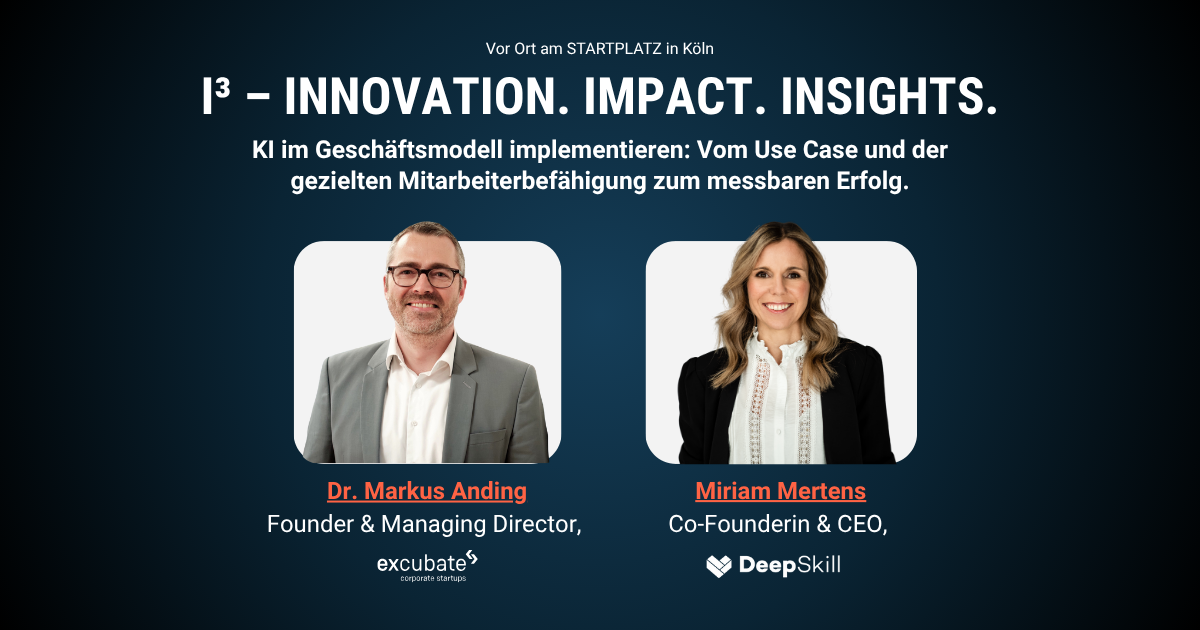07/2025

Integrate artificial intelligence effectively in companies
Insights from DeepSkill & Excubate's I³ event
At a joint event I³ — Innovation. Impact. Insights. by DeepSkill and Excubate on June 24 at STARTPLATZ Cologne, it quickly became clear: The companies have long been working intensively on studies, use cases and tools.
How is it possible not only to think of artificial intelligence as a strategy on paper, but also to effectively anchor it in the company?
Brought their perspectives Miriam Mertens (DeepSkill) and Dr. Markus Anding (Excubate) one — two experts who showed in a practical way how companies can implement AI holistically: technologically, operationally and culturally.
AI Ambition — How far do you want to go?
Excubate opened with a question that leads directly to the center of the strategic discussion:
How much AI does your company really want — and how fast do you want to move forward?
Whether you are a “pedestrian” just testing individual AI ideas, as a “cyclist” who has already implemented initial projects or as a “car driver” you rely on an AI-first strategy — the level of maturity of companies is very different. What is important is that you need a clear goal and a strategy to achieve it.
Excubate presented two central models for this path:
- that DIPOC model offers a structured roadmap for anchoring AI in the company — from new decision logics (decision-making), suitable incentive systems (incentives) and automated processes (processes), to necessary roles and structures (organization) and targeted competence development (capabilities).
- that Digital Value Canvas helps companies to think holistically about the impact of AI — from specific applications in everyday operations to strategic positioning in the market.
This makes it clear that AI not only affects IT and data — it is changing decision-making processes, working methods and value creation in almost all areas of the company.
Your own role as a manager must be questioned as well as existing structures, responsibilities and incentive systems.
Workforce enablement — How to really move your organization
From a DeepSkill perspective, it is clear:
Technological advances alone are not enough — the decisive factor is how well people in the company are prepared for them.
As a first step, we have the key areas of expertise for successful AI transformation presented. This results in three central learning areas that address all levels in the company:
- Building Trust & Skills: Basic knowledge about AI, how language models work, legal frameworks and internal guidelines.
- Optimizing value creation: Identify application options in everyday business and identify specific use cases.
- Expanding human potential: Empower managers and employees to actively work with AI and develop a future-oriented attitude.
On this basis, we have shown how targeted Workforce enablement Empowers organizations to implement AI sensibly — instead of just observing.
Our recommendations:
- Start with a representative group from the company (various areas, age groups, roles)
- Determine specific Use cases and learning needs
- Obtain all relevant stakeholders How managers and works council at an early stage
- Bet on a targeted enablement — depending on target group, role and level of maturity
With our AI Workforce Enablement Matrix We offer a practical tool that helps organizations to systematically identify continuing education needs and plan appropriate measures.
Summary & download
All models, use cases and discussions presented can be found in our compact event handout.
This also includes our AI Workforce Enablement Matrix, with which you can specifically analyze continuing education needs and plan measures in a structured manner.
